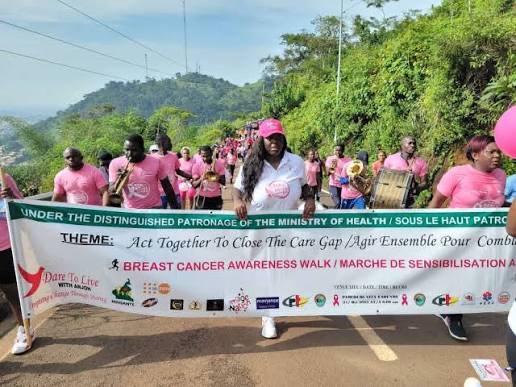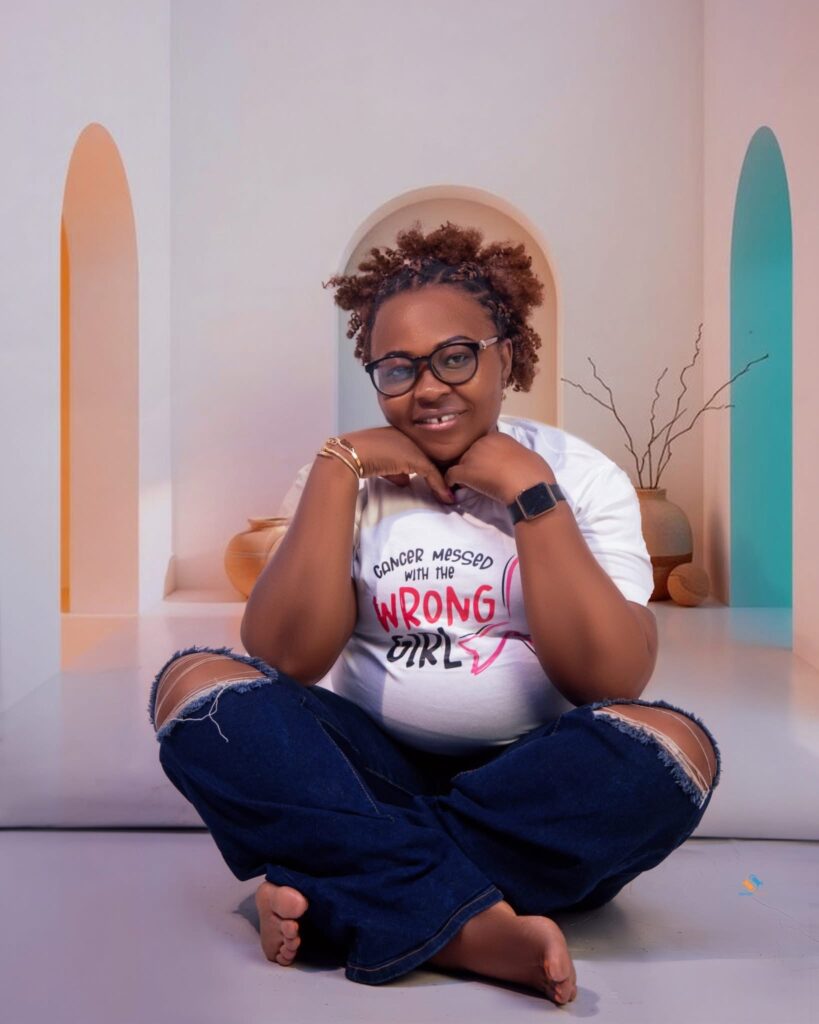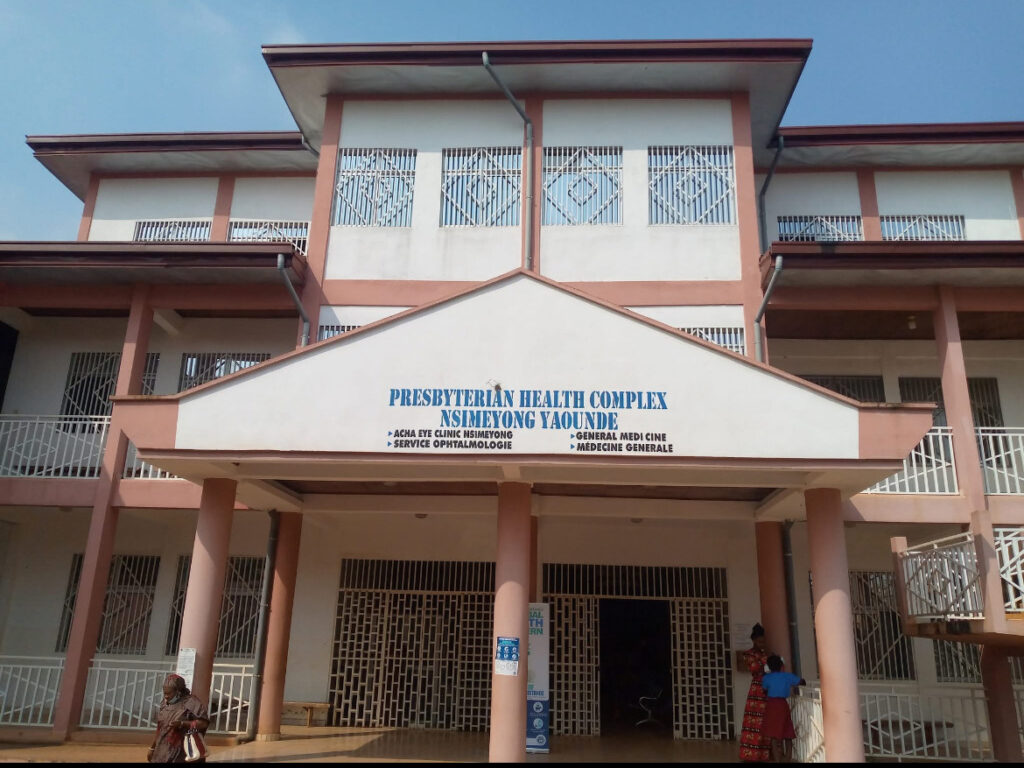The mornings are often the hardest for Chin Kewir Fonyuy Julie Epse Njakwe. By 8 a.m., the benches outside the Breast and Cervical Cancer Unit at the Presbyterian Health Complex in Yaoundé are already full. Women of all ages and occasionally, men, wait their turn for screening. Julie has worked here since 2019, and every day she braces herself for the look on patients’ faces when told it might be too late.
She screens an average of 30 women daily, but too many arrive only when the disease has already advanced.
“If a woman is developing breast cancer she will not know because nothing happens in the body. That is why there is a serious call on every woman every month for them to check the breast 7 days after ovulation… If a woman does not do any of these, she will never know anything because there are no signs and symptoms, no pain or anything she can feel to know,” she says.
While late testing remains one of the biggest barriers, she notes that it is often accompanied by poor adherence to treatment, neglect of therapy sessions and lack of a supportive community: “Over the years in this hospital, the rate of diagnoses have been increasing, even the inflow of patients has increased and it’s rather unfortunate that many women sit and come at the dying minute. There is a call for concern to every woman to act immediately because not everyone’s story is the same…”
Every October, Cameroon joins the rest of the globe to commemorate the ongoing fight against breast cancer. Typically, streets and social media timelines are awash with billboards, slogans and calls for women to get screened and join the fight against the disease. In recent years, several civil society groups and advocates have stepped in to bridge the awareness gap through outreach and community-driven initiatives.
One of them is the Welisane Foundation, which organizes an annual breast cancer awareness walk in Yaoundé every October, drawing hundreds of participants dressed in pink.

On the surface, awareness seems to be widespread and well received by target audiences. Yet, behind even the most visible campaigns, challenges remain far more complicated, and devastating too: Even in the heart of major cities like the nation’s capital, Yaounde, health personnel continue to witness patients arriving too late, when tumors have grown, treatment options are limited and hope hangs by a thread.
According to the Ministry of Public Health, in 2022 alone, breast cancer claimed 2,285 Cameroonian women, more than five every day. While health personnel see patterns, the human stories behind each case reveal the true weight of the disease responsible for 670,000 deaths annually, according to the World Health Organisation.
One of such stories which has stayed with her all this while, Julie notes, was of a 42-year-old lady whose kid died at childbirth. Mistaking the lump in her breast for post-partum changes which will go away, she proceeded to neglect the pains, finally getting a diagnosis when it was too late.
“… Unfortunately,” Julie reveals, “people started giving her their own ideas after she had started the chemotherapy and she stopped. It became worse when she left Yaounde to another clinic in Buea where her breast was amputated and after some time she died.”
A community of hope and support
Verlda Lumngwena, 33, was on the upper side of luck. The early signs were there but she conveniently overlooked them until she started losing loved ones to the disease. Her diagnosis was confirmed by a doctor in 2023 when she visited hospital following a self examination. “Before the doctor confirmed, I knew a little about breast cancer. A dear friend of mine suffered from it and finally died in October 2022, and in early January 2023, a classmate of mine died too. That was when it dawned on me that I had to check my breast and behold that same January, I was told I had stage 4 breast cancer.”
While managing the disease and following treatment remains a major challenge, the bigger issue is first accepting the reality. Verlda, like thousands of others who get their diagnosis daily, was no exception. For about three months, she struggled to accept the reality but once she did, it marked a turning point for her. “Emotionally at first I was at my lowest point but as time went on, I became a motivation to myself and others around me,” she says.
Community engagement especially in marginalised and lower-resource groups have proven to increase awareness of cancer signs and symptoms, as well as encourage screening and healthy behaviours. According to a 2025 study, it has also shown to influence reception of healthcare and overall survival. Online community support (digital peer groups) have also shown to play a role, as a pilot study found that among outpatient cancer patients, engagement in an online community was feasible and associated with improvements in domains of quality of life for those who engaged more deeply.
But in most communities, stigma around the disease remains prevalent and in some cases, shunned, causing those diagnosed to be stigmatised. “For the social part, most people did not even know I was sick until the GoFundMe period. I went to church regularly, just a few Christians in my church knew I was sick. And since I was not also losing weight… I had a high level of self esteem,” Verlda explains, adding that she kept active on social media too but avoided meetings that warranted her physical presence.
When she let her close circle in on her diagnosis, they provided all the support they could for her. From her family to friends, church and even village community stepped in for her, lifting the psychological and financial burden of treatment which at times amounted to up to 250,000 FCFA monthly. “I never felt the weight of footing the bills or going through chemotherapy sessions. My own parents were not even aware I was sick, but all my financial needs were met with so much ease.”

In December 2023, a Canadian-based friend created a GoFundMe page for her care, raising up to 3,000,000 FCFA. But Verlda’s luck does not come to many. From accusations of witchcraft to spiritual attacks and karma, multiple false narratives continue to be propagated about breast cancer.
“In our country it is very difficult to have the community support positively,” Julie explains, “because there are a lot of misconceptions concerning breast cancer. There are people going around with stories that girls should give their breasts to men to suck so they won’t have breast cancer, that is a misconception.”
According to a study in the Pan African Medicine Journal, about 73% of patients live in urban areas, but the greatest number of patients succumbing with cancer before 5 years are living in rural environments. “Women living in urban zones,” it narrates, “have a high standard of living and therefore have a breast cancer risk twice as high as those living in rural areas.”
Beyond misinformation and lack of the financial means, even some patients diagnosed remain scared of getting treatment due to lack of information or lack of faith in the healthcare system. For many years, Cameroon’s healthcare system has faced criticism for both its structural, operational and systematic deficiencies. “With our community it is very difficult as people are afraid of any treatment related to breast cancer like chemotherapy and radiotherapy but there are people who have received the treatment and are doing good,” Julie assures.
A 2025 BMC Public Health public study further asserts that people with lower socioeconomic status are more likely to present with advanced disease than those with higher socioeconomic status, due to poor symptom knowledge, emotional barriers and de-prioritising medical help-seeking against meeting daily needs. With an estimated 4 in 10 Cameroonians living below the national poverty line, a situation that has changed little for 20 years, they tend to be more prone to late diagnoses and lack of treatment.
Leaving no one behind
Verlda is not letting the fear of stigma get to her. She is among the many who have chosen to play their part by raising awareness, sometimes leading her own campaigns. “I have been encouraging women even through my social media platforms to go for screening because early detection is good and it saves lives… I also encourage especially women above the age of 40 to do a mammogram which detects early breast cancer before the signs start showing,” she notes.
Like Verlda, Julie believes it is important to keep spreading the word to let all know a diagnosis is not a death sentence. However, she notes that contrary to popular belief, breast cancer is not a woman-only disease. “… Breast cancer does not affect women only. A man can also develop breast cancer because on every body, there is a breast… a man is also supposed to check and with men they can observe at any time since they do not have a menstrual cycle to disrupt the observation for them.”

Welisane Nkeng of the Welisane Foundation believes beyond community and personal efforts, there is an urgent need for policy intervention to address the underlying issues. “There is much work to be done at the level of education … if we have many more women on decision making tables, we will be able to have more stakeholders because they understand the challenges of breast cancer,” she told The Guardian Post.
The reality of breast cancer in Cameroon is beyond the pink ribbons and the figures that characterise the awareness month. To hundreds of thousands, it is a daily fight, a family struggle and a call for collective action and inclusion. With awareness as only a first step, understanding, support and timely care are what truly saves lives.
By Giyo Ndzi & Chi Emeh*
This article was first published in The Guardian Post newspaper Issue No. 3504 (24/10/2025)
